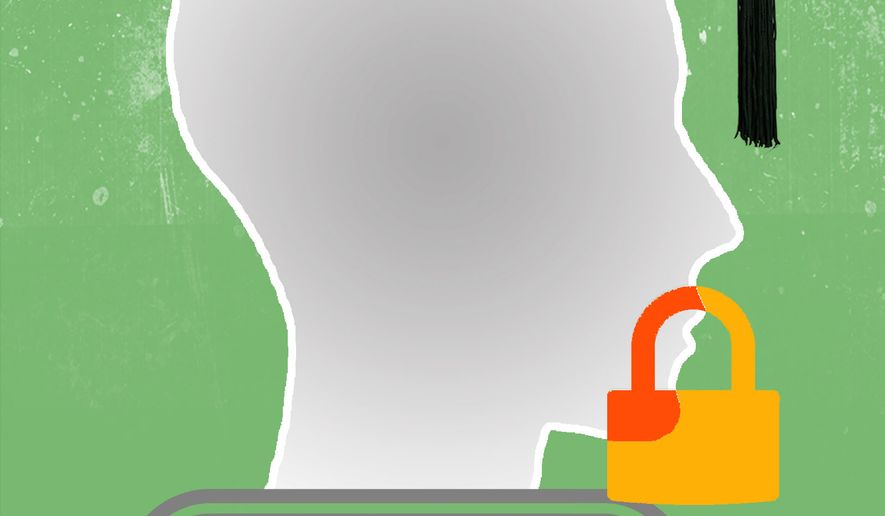OPINION:
The tragic assassination of Charlie Kirk at Utah Valley University is a tremendous loss for our country and a bellwether for how far we’ve fallen as a nation from our founding principles. Charlie was on campus in Utah to engage in what our nation’s universities used to embrace: the free and open debate of ideas. He understood, as the Supreme Court stated in 1960, that the “vigilant protection of constitutional freedoms is nowhere more vital than in the community of American schools.”
Universities were once billed as the “marketplace of ideas.” Over time, that marketplace closed.
The free speech that Charlie sought to restore to college campuses through his public debates has slowly been eroded over the past three decades by university administrators and faculty.
In the late 1980s and early 1990s, universities sought to oust free discussion by labeling certain viewpoints “politically incorrect.” Administrators enacted campus policies that prohibited so-called harassment, prohibiting such things as “demeaning” speech. They routinely lost in court challenges to those policies.
The political correctness movement spawned speech codes. Campuses across the country sought to prohibit “offensive” speech. In one case, San Francisco State University investigated the College Republicans chapter on campus for months after it held an anti-terrorism rally on campus. The group later sued and won an injunction against a systemwide California State University policy that banned incivility on campus.
Things got so bad that in 2006, the Foundation for Individual Rights in Education started publishing an annual survey of speech restrictions on college campuses and labeling schools red, yellow or green. The vast majority of colleges were red in 2006, and nine out of 10 colleges in the foundation’s 2025 report continue in that vein.
University administrators and illiberal faculty also devised techniques to marginalize speakers they disagreed with or silence them altogether. Administrators enacted trigger warning policies that required a speaker deemed too offensive to place signs around the event notifying passing students that they might feel offended if they listened to the speaker’s ideas. Of course, the administrators ignored bedrock constitutional law that prohibits speech restrictions based on the reactions of listeners.
Not satisfied with merely banning speech based on the offense it caused in listeners, colleges also adopted speech zones, limiting student and nonstudent speech to remote areas of campus. Colleges also would simply dispose of unfavorable speech. A student newspaper named The Liberty at Oregon State University found its distribution bins confiscated and in a trash heap after it published an article critical of the administration.
Eventually, students began bullying their peers and censoring viewpoints they disliked. A conservative Christian student at Georgia Tech found demeaning pictures of herself on campus and received death threats, requiring campus police to follow her to class after she had the courage to sue the university for violating her free speech.
The years of censorship created student bodies on campus that are completely intolerant of opposing viewpoints. Students now routinely shout down campus speakers. In 2022, Yale law students shouted down Kristen Waggoner, head of Alliance Defending Freedom, after she tried to give a speech on, of all things, free speech. A year later and 3,000 miles away, Stanford law students shouted down U.S. Circuit Court Judge Kyle Duncan while he tried to speak to a group of students who invited him. The law school’s diversity, equity and inclusion dean supported the students’ hostile antics.
Two generations of students have attended universities that taught them that they can and should silence people they disagree with. Is it any wonder we’ve hit rock bottom?
As a Christian and a conservative, Charlie Kirk sought to restore free speech on college campuses. He embraced our first freedoms, religious liberty and free speech, and knew our country had slowly strayed from those principles. He championed things that universities only pretended to embrace.
Charlie welcomed disagreement. Dissenters who showed up at his events got to ask the first questions. He engaged with people; he didn’t silence them. He treated them with respect and let them be heard. He knew the truth would prevail. Whether or not you agree with his politics, he represented the best of what we can be as Americans.
Charlie Kirk’s death marks a horrible low point for free speech in America. He strove to reopen the marketplace of ideas. Because of the vision he inspired in so many young people across the nation, we can only hope that many people will honor his memory by continuing his work.
• David Hacker is vice president of legal services and senior counsel at First Liberty Institute. He has been a champion for religious liberty throughout his 20-year career.




Please read our comment policy before commenting.